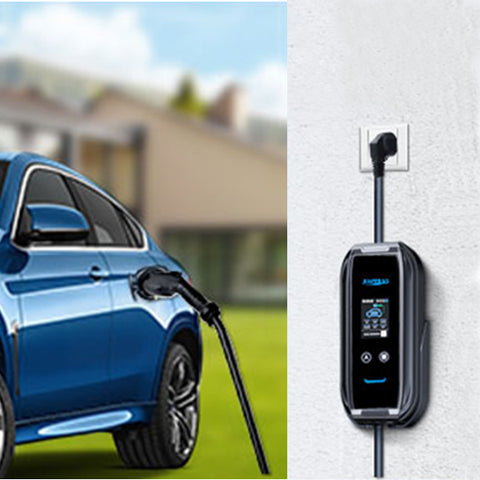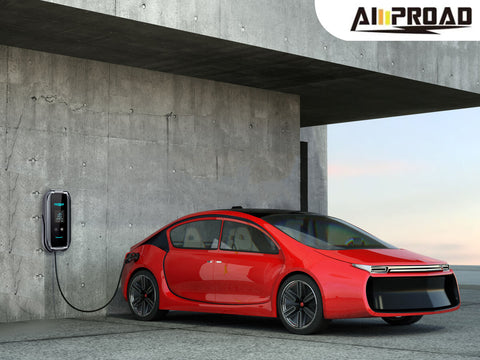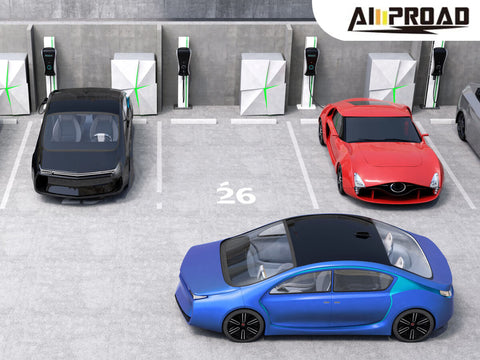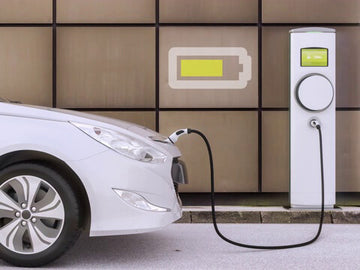
Confused by the different types of EV chargers? You're not alone! Choosing the right charger can feel like picking a champion in a competition. This guide will be your ring announcer, introducing you to the various EV charger contenders and their strengths. We'll explore the differences between Level 1, Level 2, and DC Fast chargers, along with how installation options and features can impact your decision. We'll even break down safety considerations and cost factors to ensure you pick the EV charger that's the perfect champion for your electric vehicle and charging needs!
Different EV Chargers and Their Moves
When it comes to Electric Vehicle (EV) chargers, each type has its own strengths and best-use scenarios. Let's take a closer look at the options available:
Level 1 Charger
Level 1 chargers are the most basic option, plugging into standard household outlets. While they provide the slowest charging speed, they're perfect for occasional top-ups or overnight charging. They're convenient for those with limited charging needs or who have access to charging at home.
Level 2 Charger
Level 2 chargers offer faster charging compared to Level 1 chargers and are typically installed at home or in workplaces. They're the ideal choice for daily commutes or regular use, providing a faster charge that can replenish your vehicle's battery overnight or during the workday, ensuring you're ready to go whenever you need.
DC Fast Charger
DC Fast Chargers are the fastest option, providing rapid charging for electric vehicles. They're commonly found at public charging stations and are perfect for long trips or when you need a quick charge on the go. With their high-speed charging capabilities, they can provide a significant boost to your vehicle's battery in a short amount of time.
Comparing Charging Speeds
When comparing charging speeds, it's essential to consider the time it takes to replenish your vehicle's battery. Level 1 chargers offer the slowest charging speed, typically taking several hours to fully charge a depleted battery. Level 2 charging provides faster charging, with most electric vehicles fully charged overnight. DC Fast Chargers are the quickest option, capable of providing an 80% charge in as little as 30 minutes, making them perfect for quick stops during long journeys.
By understanding the strengths and charging speeds of each EV charger type, you can choose the option that best fits your needs and lifestyle, ensuring a smooth and convenient charging experience for your electric vehicle.
Hardwired vs. Plug-in
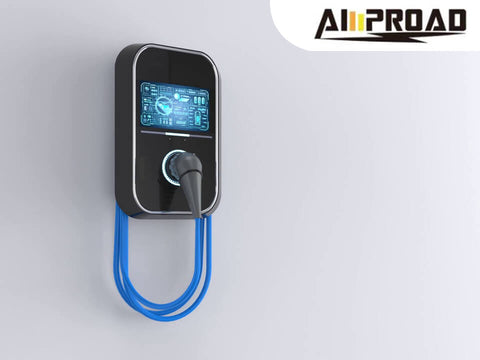
When it comes to installing your EV charger, you have two main options: hardwired and plug-in. Let's explore the differences between them:
The Permanent Hardwired Charger (requires electrician)
Hardwired EV chargers are installed directly into your electrical system, providing a permanent and dedicated charging solution for your electric vehicle. This installation method requires the expertise of an electrician to safely connect the charger to your electrical panel. Hardwired chargers offer a streamlined and integrated charging solution, with no need to plug and unplug the charger each time you need to charge your vehicle.
The Flexible Plug-in Charger (connects to existing outlet)
Plug-in EV chargers, also known as portable chargers, connect to an existing electrical outlet, providing a more flexible and versatile charging option. These chargers are typically easier to install and can be moved to different locations as needed. Plug-in chargers offer convenience for renters or those who may need to relocate their charger in the future. However, they may not provide the same level of power output as hardwired chargers. Far not, you can consider AMPROAD Level 2 portable EV charger with max 40A input volume for both home and on-the-go.
Deciding on Installation Style
When deciding between hardwired and plug-in chargers, consider your specific needs and circumstances. Hardwired chargers offer a permanent and dedicated charging solution, ideal for homeowners or those with dedicated parking spaces. They provide a higher power output and may be required for faster charging speeds. On the other hand, plug-in chargers offer flexibility and versatility, making them suitable for renters or those who may need to move their charger in the future. Consider factors such as your living situation, charging requirements, and long-term plans to determine the installation style that best suits your needs.
By carefully considering the pros and cons of hardwired and plug-in EV chargers, you can choose the installation style that aligns with your lifestyle and provides a convenient and efficient charging solution for your electric vehicle.
Smart vs. Basic Chargers
When selecting an EV charger, you'll encounter both smart and basic options. Let's explore the differences between them:
Smart Charger (scheduling, monitoring, app control)
Smart EV chargers offer advanced features designed to enhance convenience and efficiency. These chargers typically come equipped with features such as scheduling, allowing you to set charging times to take advantage of off-peak electricity rates. They also provide real-time monitoring of charging status and energy consumption, giving you insights into your charging habits. Additionally, many smart chargers can be controlled remotely via a smartphone app, allowing you to manage charging sessions from anywhere.
Basic Charger (simple and reliable)
Basic EVSE chargers, also known as non-smart or standard chargers, offer a simple and straightforward charging solution. These chargers provide reliable charging without the bells and whistles of smart chargers. While they may lack advanced features such as scheduling and remote control, basic chargers are often more affordable and easier to use. They're a reliable option for those who prioritize simplicity and functionality in their charging setup.
Choosing Your Features: Selecting the Right Tools for the Job
When deciding between a smart and basic EV charger, consider your specific needs and preferences. If you value convenience and advanced functionality, a smart charger may be the right choice for you. Features such as scheduling and remote control can make charging more convenient and efficient, especially if you have a variable schedule or want to optimize energy usage. However, if you prefer a simple and reliable charging solution without the added complexity, a basic charger may be the better option. Evaluate the features offered by each charger type and choose the one that best aligns with your charging needs and lifestyle.
By selecting the right features for your EV charger, you can ensure a seamless and efficient charging experience for your electric vehicle.
Safety Standoff
Ensuring safety is paramount when it comes to selecting an EV charger. Here's what to consider:
Are There any Safety Certifications?
Before purchasing an EV charger, verify if it meets safety standards and certifications. Look for certifications such as ETL, UL, or CE, which ensure the charger's compliance with rigorous safety requirements. These certifications guarantee that the Level 2 EV charger has undergone testing to ensure its safety and reliability.
Researching Recalls: Avoiding Risky Maneuvers
Investigate if there have been any recalls or safety incidents associated with the charger model you're considering. Check manufacturer websites, consumer reports, and recall databases to ensure the charger has a clean safety record. Avoid models with a history of safety issues to protect yourself and your electric vehicle from potential risks.
Balancing Cost and Value
When evaluating EV chargers, it's essential to strike a balance between cost and value. Consider not only the upfront price of the charger but also factors such as installation costs, energy efficiency, and long-term savings. While opting for a cheaper charger may seem like a cost-effective choice initially, investing in a higher-quality charger with advanced features and safety certifications can provide better value and peace of mind in the long run. Evaluate the total cost of ownership, including maintenance and warranty coverage, to make an informed decision that maximizes both affordability and quality.
The Initial Investment
The upfront cost of an EV charger is the first consideration. Prices vary depending on the charger type, brand, and features. While it's tempting to opt for the cheapest option, consider the long-term benefits and durability of a higher-quality charger. Investing a little more upfront can result in better reliability and performance over time.
By prioritizing safety certifications, researching recalls, and balancing cost and value, you can select a Level 2 charger that not only meets your charging needs but also prioritizes your safety and peace of mind.
Installation Cost
Installation costs are often overlooked but can significantly impact the total cost of ownership. Assess the electrical requirements and any additional installation expenses, such as hiring an electrician or upgrading your electrical panel. Factor in these costs when budgeting for your EV charger to avoid surprises down the road.
Smart Charging Savings
Smart charging features can offer significant savings over time. Features like scheduling charging during off-peak hours or remotely monitoring energy usage can help optimize energy consumption and lower electricity bills. While smart chargers may have a higher upfront cost, the potential savings in energy efficiency can make them a worthwhile investment in the long run.
By balancing the initial investment, installation costs, and potential savings from smart charging features, you can make an informed decision that maximizes both affordability and value. Prioritize quality and reliability to ensure a satisfactory long-term investment that meets your charging needs and enhances your electric vehicle ownership experience.
Choosing the Perfect EV Charger
Selecting the right EV charger is essential for a seamless charging experience. Here's how to find your perfect match:
Matching Your Charger to Your Lifestyle
Consider your lifestyle and charging needs when choosing an EV charger. If you have a busy schedule and need quick recharges, opting for the fastest home EV charger with rapid charging capabilities can be advantageous. On the other hand, if you have a more relaxed charging routine and prioritize affordability, a standard charger may suffice.
Picking the Right Champion for You
Evaluate the features offered by different EV chargers and prioritize those that align with your preferences. If convenience is essential, look for chargers with smart charging capabilities, such as scheduling and remote monitoring. For eco-conscious drivers, choosing a charger with energy-efficient features can help minimize your environmental footprint.
You and Your Perfectly Charged EV!
Once you've assessed your lifestyle and charging needs and identified the features that matter most to you, it's time to select your perfect EV charger. Whether you opt for the fastest home EV charger for rapid recharges or prioritize smart features for added convenience, choosing the right charger ensures that your electric vehicle stays charged and ready for your next adventure.
By matching your charger to your lifestyle, prioritizing features that matter to you, and selecting the perfect EV charger, you can enjoy a convenient, efficient, and enjoyable electric vehicle ownership experience.
FAQs / People Also Ask
Q: How do I choose the right EV charger for my electric vehicle?
A: Consider factors such as your driving habits, charging needs, and budget when selecting an EV charger. Assess the different charger types available (Level 1, Level 2, DC Fast Charger) and their respective features to find the best match for your requirements.
Q: What are the benefits of a smart EV charger?
A: Smart EV chargers offer advanced features such as scheduling, energy monitoring, and remote control via smartphone apps. These features enhance convenience, efficiency, and cost savings by allowing you to optimize charging times and monitor energy usage remotely.
Q: What safety certifications should I look for in an EV charger?
A: Look for safety certifications such as ETL, UL, or CE, which ensure that the charger meets rigorous safety standards and requirements. These certifications guarantee the charger's compliance with electrical safety standards and provide assurance of quality and reliability.
Q: How much does it cost to install an EV charger at home?
A: Installation costs for an EV charger vary depending on factors such as electrical upgrades, labor costs, and permits. On average, homeowners can expect to pay between $500 to $2,000 for installation, but prices may vary depending on individual circumstances and requirements.



